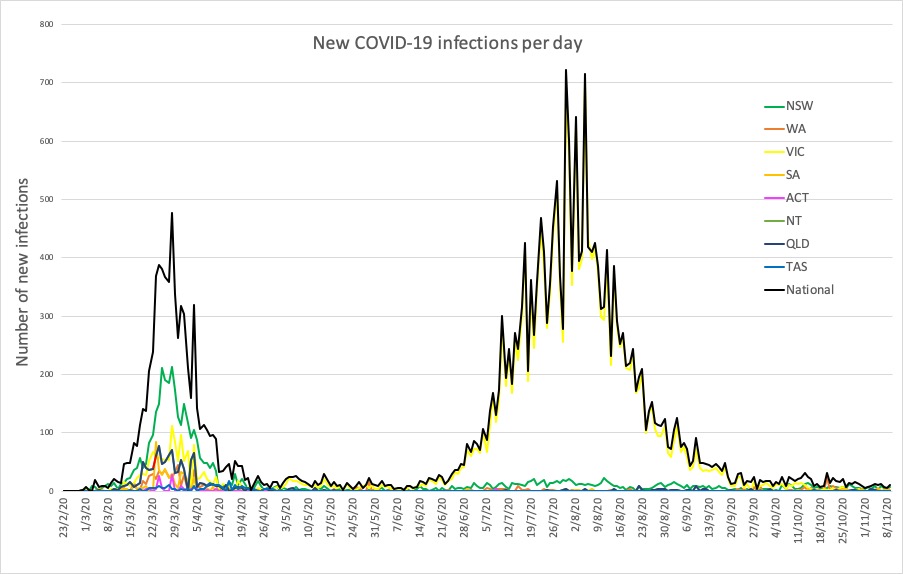Preliminary data suggests that Pfizer and BioNTech’s SARS-CoV-2 vaccine may have an efficacy of around 90%, without any significant safety issues.
Welcome to The Medical Republic’s COVID Catch-Up.
It’s the day’s COVID-19 news in one convenient post. Email bianca@biancanogrady.com with any tips, comments or feedback.
10 November
- Interim results for Pfizer/BioNTech COVID-19 vaccine suggest 90% efficacy.
- Chlamydia notifications significantly reduced during pandemic but may be due to less screening.
- Older individuals and those with comorbidities more likely to be readmitted to hospital after COVID-19.
- Another nail in the hydroxychloroquine coffin: no benefits in adults hospitalised with COVID-19.
- Latest confirmed COVID-19 infection numbers from around Australia.
- Preliminary, unpublished data suggests that Pfizer and BioNTech’s SARS-CoV-2 vaccine may have an efficacy of around 90%, without any significant safety issues.
The companies released an interim analysis of data from their phase 3 clinical trial of vaccine BNT162b2, which targets the virus’ spike protein. Nearly 39,000 volunteers have now received two doses of the vaccine, out of a total of 43,538 participants.
There have been 94 COVID-19 cases recorded in study participants. The press release did not detail the split of cases between the treatment and placebo arms of the study, but said the breakdown suggested a vaccine efficacy of 90%.
The trial population includes 42% with diverse backgrounds, although the press release did not offer any breakdown of cases according to ethnicity, gender or age. A final analysis will be done when 164 cases of infection have been recorded. - Chlamydia diagnoses have dropped significantly in the US during the COVID-19 pandemic, but it’s not clear if this is because fewer asymptomatic infections are being detected due to lower screening rates.
A study published in Sexually Transmitted Infections looked at rates of STI notifications in the US to date this year. This revealed an overall 18.2% lower rate of chlamydia notifications compared to the same time period in 2019, while notifications for syphilis were down 6.9% and no significant change was seen for gonorrhoea.
“The greater relative decrease of chlamydia raises the possibility that asymptomatic infections, which are often diagnosed through established screening programmes, are particularly susceptible to healthcare disruptions,” the authors noted, pointing to data from Italy supporting this hypothesis. - The likelihood of readmission to hospital after COVID-19 is significantly higher among individuals aged over 65 years, those discharged to nursing homes or with home-based medical care, or with comorbidities such as COPD, heart failure, chronic kidney disease or diabetes.
A study published in Morbidity and Mortality Weekly Report looked at characteristics of more than 106,000 patients discharged from hospital after COVID-19, 9% of whom were readmitted and 1.6% of whom were readmitted more than once.
The highest odds of readmission were seen in patients with heart failure or chronic kidney disease, who had a 60% higher odds of readmission. - Yet another study has failed to find any benefits from hydroxychloroquine in the treatment of COVID-19 (are you listening, Craig Kelly?). The latest, published in JAMA, was a multicenter, blinded, placebo-controlled, randomised trial involving 479 patients across 34 hospitals in the US, with a primary outcome of clinical status at 14 days after randomisation.
The trial was halted for futility after finding no significant difference between the treatment and control arms for the primary or any of the secondary outcomes and in any subgroups.
“These findings do not support the use of hydroxychloroquine for treatment of COVID-19 among hospitalized adults.” - While Victoria continues to enjoy a lengthy run of zero new cases, NSW reported seven new COVID-19 cases yesterday, all of which are returned travellers in hotel quarantine.
Here are the latest confirmed COVID-19 infection numbers from around Australia to 9pm Monday:
National – 27,668, with 907 deaths
ACT – 114 (0)
NSW – 4469 (7)
NT – 40 (1)
QLD – 1177 (0)
SA – 517 (2)
TAS – 230 (0)
VIC – 20,345 (0)
WA – 776 (0)



